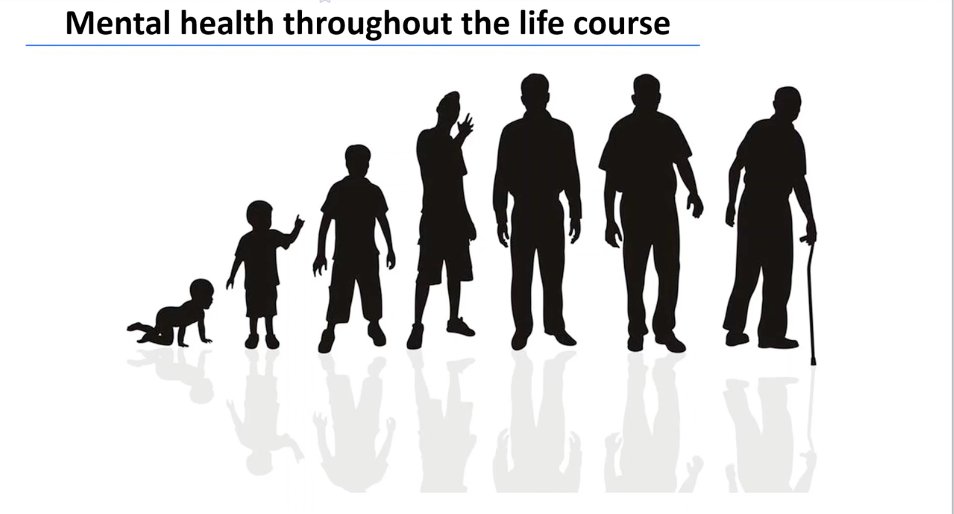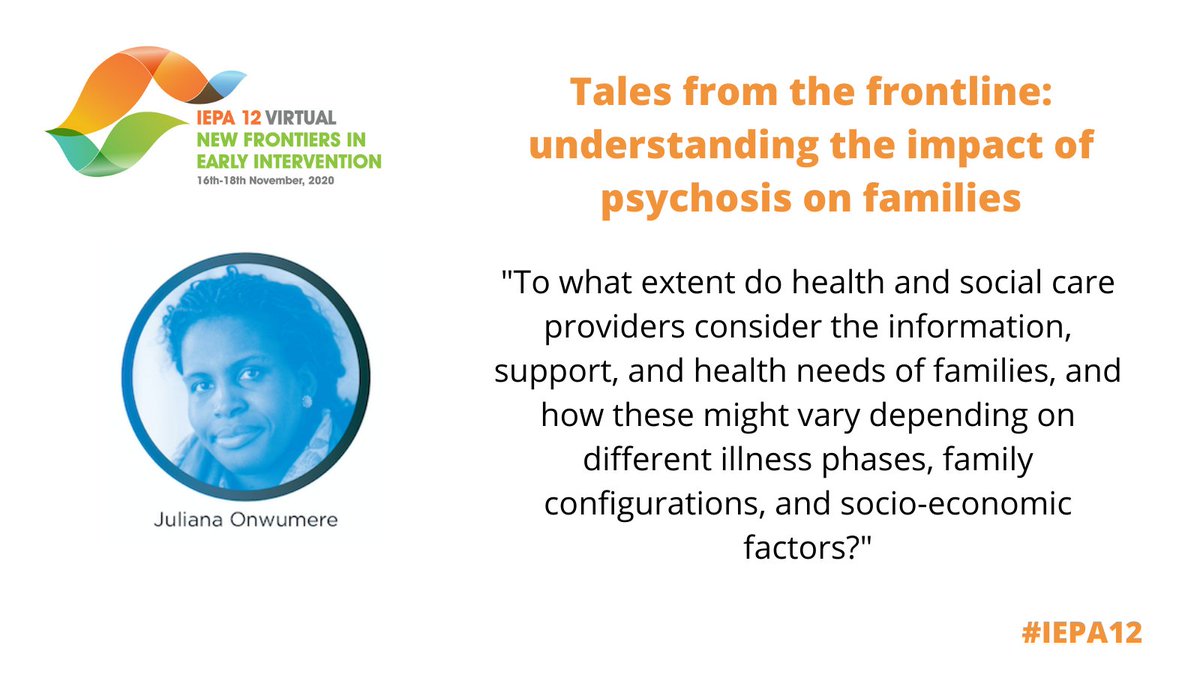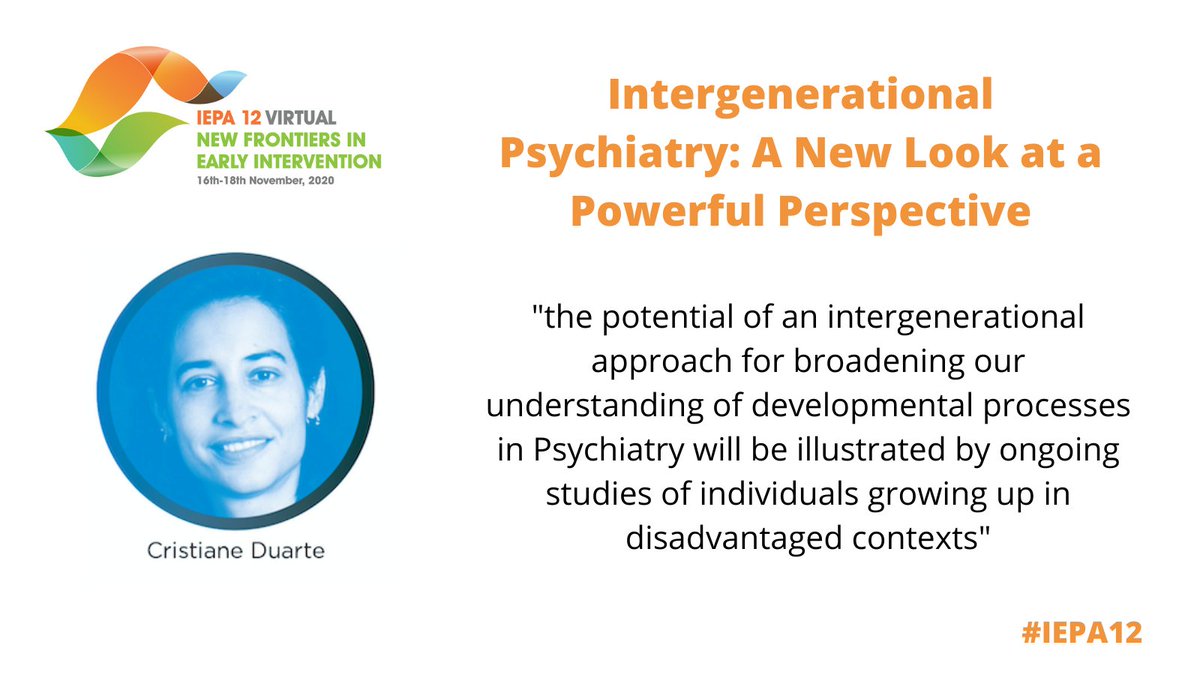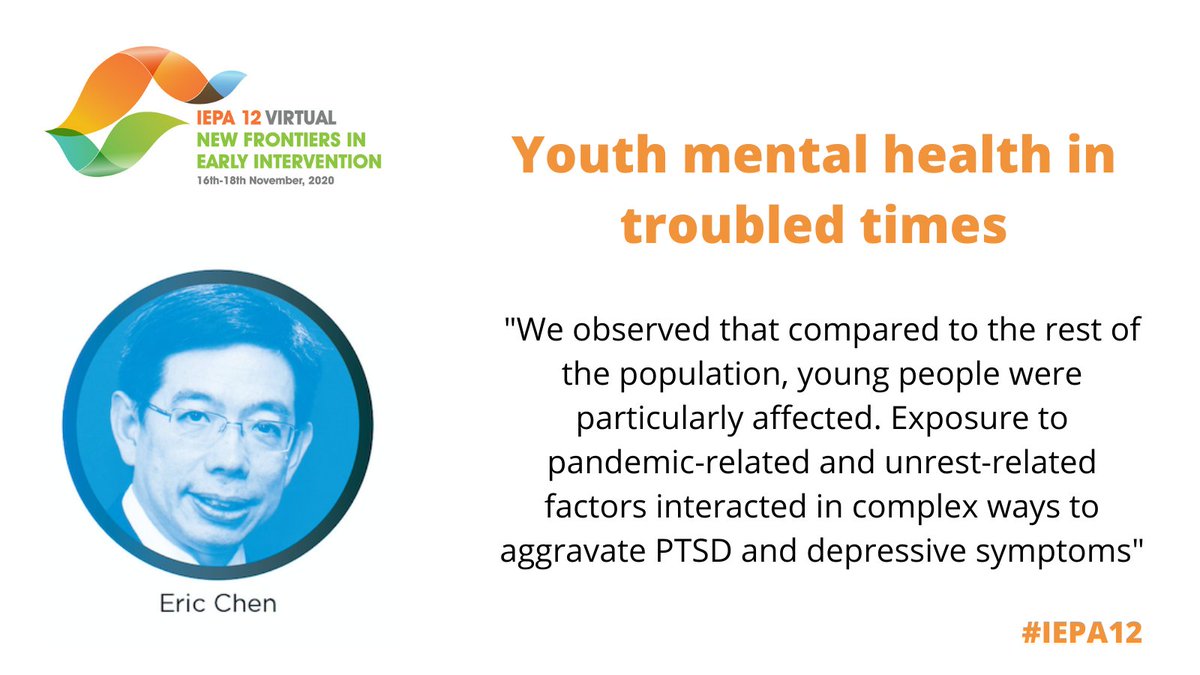
A very warm elfin welcome to the 2021 @KingsIoPPN Research Festival (Across The Lifespan)
I'm André from the Mental Elf and I'll be live tweeting for the next 3.5 hours
The hashtag today is:
🌟 #IoPPNfestival 🌟
I'm André from the Mental Elf and I'll be live tweeting for the next 3.5 hours
The hashtag today is:
🌟 #IoPPNfestival 🌟

Here's what's coming up:
- We have two keynote talks: Grainne McAlonan on autism and Terrie Moffitt on mental health across the lifespan
- Plus 21 lightning talks from other @KingsIoPPN people on everything from racism to data science
#IoPPNfestival

- We have two keynote talks: Grainne McAlonan on autism and Terrie Moffitt on mental health across the lifespan
- Plus 21 lightning talks from other @KingsIoPPN people on everything from racism to data science
#IoPPNfestival
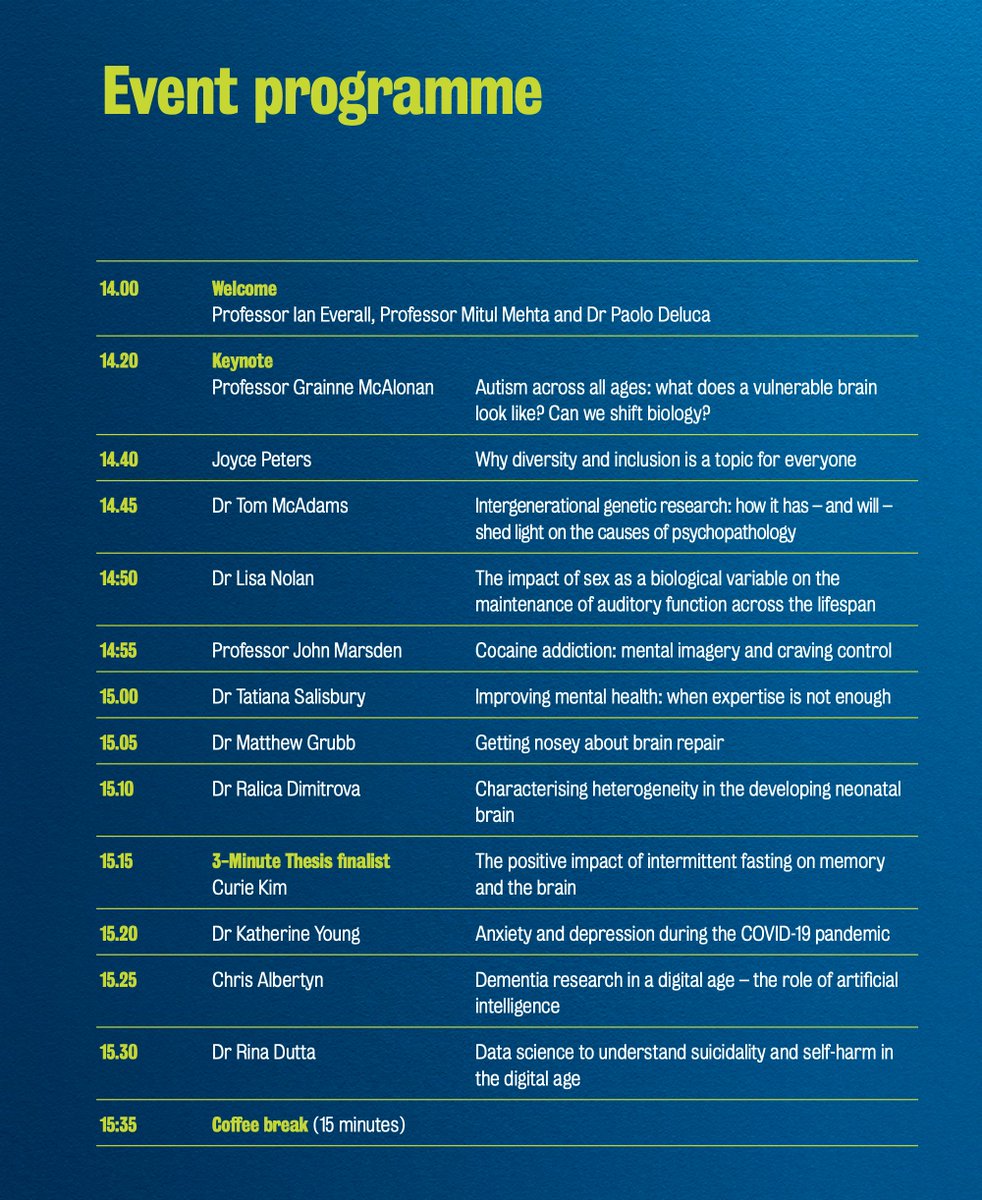

Our chairs today are Prof Ian Everall, Prof Mitul Mehta @mehta_mitul72 & Dr Paolo Deluca
They're welcoming everyone to the Teams meeting where the festival is taking place
We have hundreds of people on the webinar, plus you lovely tweeps following proceedings at #IoPPNfestival
They're welcoming everyone to the Teams meeting where the festival is taking place
We have hundreds of people on the webinar, plus you lovely tweeps following proceedings at #IoPPNfestival
Our first speaker is Prof Gráinne McAlonan who is giving a keynote talk on "Autism across all ages: what does a vulnerable brain look like? Can we shift biology?" #IoPPNfestival 

If you want to hear an accessible conversation about this work, check out the podcast interview I recorded with Gráinne McAlonan a few weeks ago #IoPPNfestival soundcloud.com/national-elf-s…
To understand the origins of brain diversity, mental health and difficulties, we need to look early in development. Individual brain structure is stabilised very early in development. Brain function is more variable, says Gráinne McAlonan at #IoPPNfestival
No single marker that differentiates cases from controls, and co-occurring conditions are common in people with autism #IoPPNfestival 

What is inherited or acquired in neurodevelopmental conditions is not a specific disorder, says Gráinne McAlonan at #IoPPNfestival
We need to look early in brain development
We need to look early in brain development

The pattern of brain function is determined by the interaction between excitation and inhibition chemical signalling systems, says Gráinne McAlonan at #IoPPNfestival
Newborns with higher likelihood of later receiving a diagnosis of autism have higher brain functional activity at birth compared to newborns with a lower likelihood of autism, says Gráinne McAlonan at #IoPPNfestival
Development of Microstructural and Morphological Cortical Profiles in the Neonatal Brain Fenchel, D., et al, 1 Nov 2020, In: Cerebral Cortex. 30, 11, p. 5767–5779 #IoPPNfestival 





Heterogeneity in Brain Microstructural Development Following Preterm Birth Dimitrova, R., et al., 1 Sep 2020, In: Cerebral Cortex. 30, 9, p. 4800-4810 #IoPPNfestival 

The developing brain structural and functional connectome fingerprint Ciarrusta, J., et al, 10 Mar 2021, In: bioRxiv #IoPPNfestival 

Emerging functional connectivity differences in newborn infants vulnerable to autism spectrum disorders Ciarrusta, J., et al, 1 Dec 2020, In: Translational psychiatry. 10, 1, 131 #IoPPNfestival 

Adults with a diagnosis of Autism Spectrum Condition have differences in the brain’s major inhibitory GABA signalling system. GABA differences alter the processing of visual sensory information but respond to GABA acting drugs, says Gráinne McAlonan at #IoPPNfestival 

Shifting brain inhibitory balance and connectivity of the prefrontal cortex of adults with autism spectrum disorder Ajram, L. A., et al., 2017, In: Translational psychiatry. 7, 5, p. 1-7 e1137 #IoPPNfestival 



Here is a summary of Gráinne McAlonan's #IoPPNfestival keynote talk: "Autism across all ages: what does a vulnerable brain look like? Can we shift biology?" 
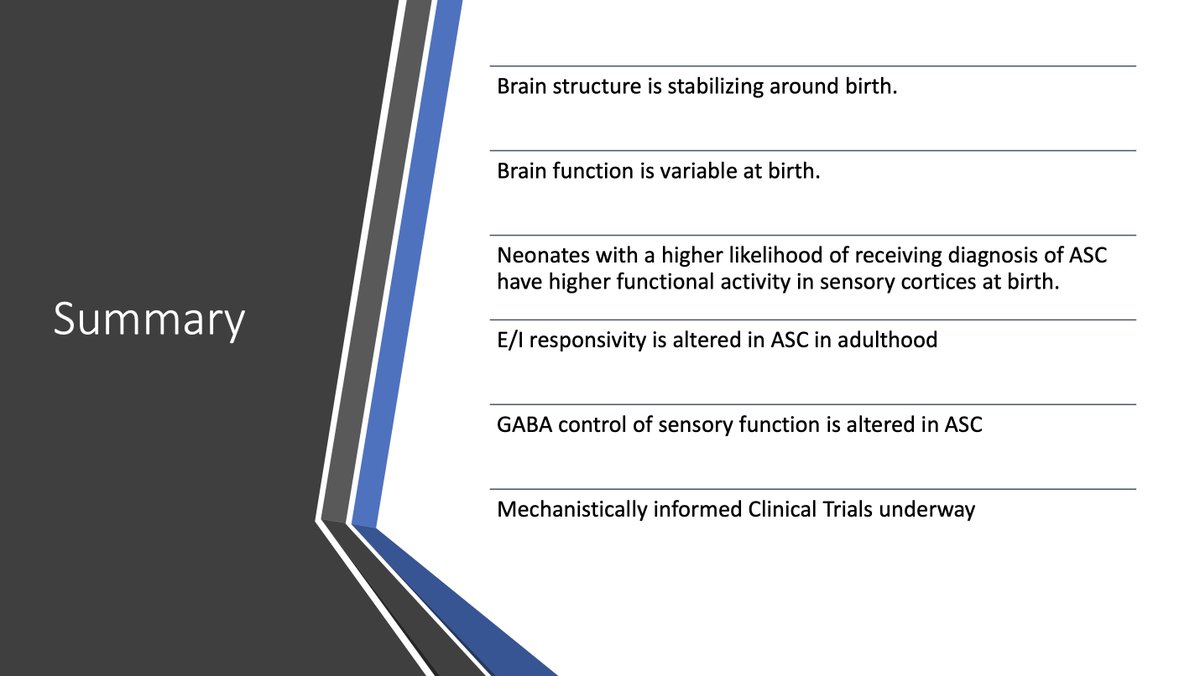
bbc.co.uk/sounds/play/m0…
Listen from about 17 mins to hear about autism studies and from 19.41 to hear from an adult participant in our pharmacological research #IoPPNfestival
Listen from about 17 mins to hear about autism studies and from 19.41 to hear from an adult participant in our pharmacological research #IoPPNfestival
Our next speaker is Joyce Peters who will be telling us "Why Diversity and Inclusion is a topic for everyone" #IoPPNfestival 

A true understanding about what racism is can come from trying to answer the question. What is racism? says Joyce Peters at #IoPPNfestival
She is the Race Equality Co-Champion at @KingsIoPPN kcl.ac.uk/hr/diversity
She is the Race Equality Co-Champion at @KingsIoPPN kcl.ac.uk/hr/diversity
Joyce Peters is citing the recent (May 2020) McKinsey report "Diversity wins: How inclusion matters" #IoPPNfestival
mckinsey.com/featured-insig…
mckinsey.com/featured-insig…
Diversity and Inclusion work isn’t a "nice to have".
Diversity and Inclusion work lays the groundwork for better decision-making, higher engagement, greater impact in our community, says Joyce Peters at #IoPPNfestival
Diversity and Inclusion work lays the groundwork for better decision-making, higher engagement, greater impact in our community, says Joyce Peters at #IoPPNfestival
Race equality at King’s #IoPPNfestival kcl.ac.uk/race-equality
If we pay some attention to these areas we will produce better work and ultimately that is what we all want, says Joyce Peters at #IoPPNfestival
Join our new initiative “The IoPPN Year of Learning”, says Joyce Peters at #IoPPNfestival
Our next speaker is @Tom_A_McAdams from @SGDPCentreKCL who is giving a short talk on "Intergenerational Genetic Research: How it Has—and Will—Shed Light on the Causes of Psychopathology" #IoPPNfestival 

There are lots of reasons why mental health problems run in families, says @Tom_A_McAdams at #IoPPNfestival 

Studies about parent effects on mental health need to be genetically informed, says @Tom_A_McAdams at #IoPPNfestival
Genetically informed research indicates that antenatal exposure to maternal anxiety and depression does not predict emotional and behavioural problems in children after controlling for shared genetics. Postnatal exposure however, does, says @Tom_A_McAdams at #IoPPNfestival 

Genomic family-based datasets are likely to play a key role in coming years in teaching us about the causes of psychopathology, says @Tom_A_McAdams at #IoPPNfestival 
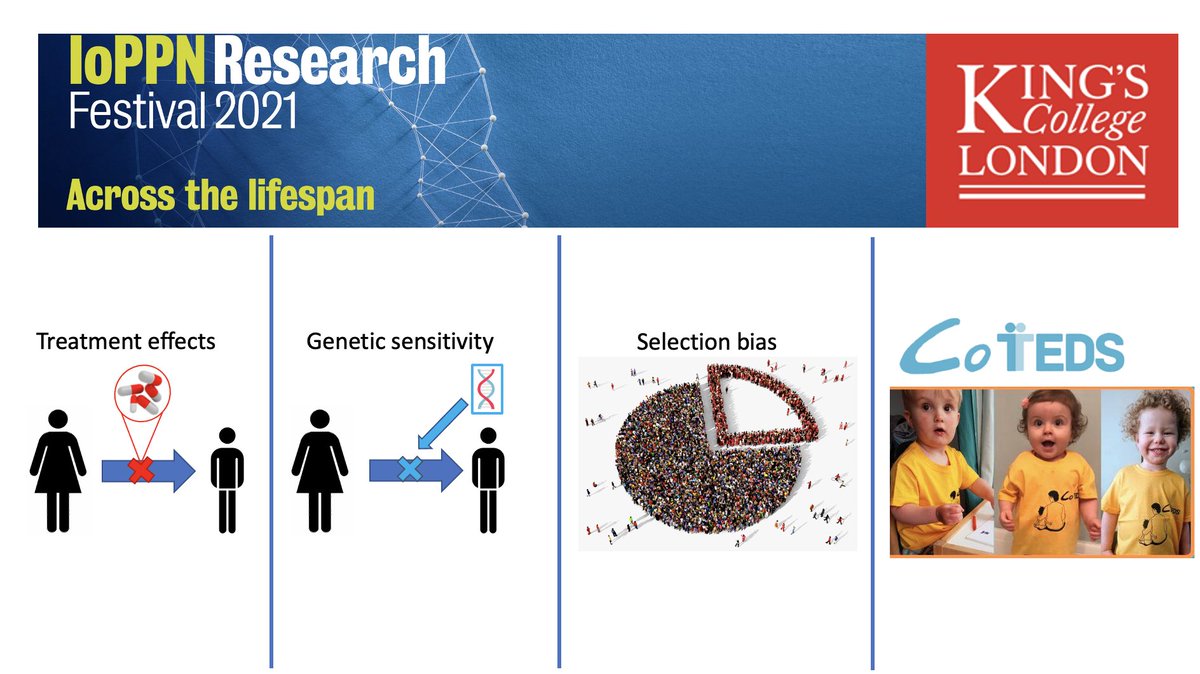
@Tom_A_McAdams et al Systematic review and meta-analysis of genetically informed research: Associations between parent anxiety and offspring internalising problems (2021). Journal of the American Academy of Child and Adolescent Psychiatry #IoPPNfestival doi.org/10.1016/j.jaac…
Our next speaker is @Lisa_S_Nolan27 from @WolfsonCARD who will be briefly talking about "The Impact of sex as a biological variable on the maintenance of auditory function across the lifespan" #IoPPNfestival 

There are sex-differences in susceptibility to age-related hearing loss (ARHL); it is more common, more severe and manifests earlier in men compared to women, even accounting for confounders such as noise exposure, says @Lisa_S_Nolan27 at #IoPPNfestival 

Understanding the molecular pathways underlying these sex-differences is crucial to accelerate precision medicine therapies for ARHL, says @Lisa_S_Nolan27 at #IoPPNfestival
Genetic variation in the estrogen-related receptor gamma (ESRRG) gene is associated with age-related hearing loss in women of post-menopausal age, says @Lisa_S_Nolan27 at #IoPPNfestival
By generating a novel mouse model lacking the Esrrg gene in the inner ear, we can characterise the role of Esrrg in the cochlea to understand how this gene maintains hearing, says @Lisa_S_Nolan27 at #IoPPNfestival
Our next speaker is John Marsden who will be talking about "Cocaine Addiction: Mental imagery and Craving Control" #IoPPNfestival 

Cocaine use disorder (CUD) is prevalent and hard to treat. CUD develops rapidly through adaptive learning processes and is experienced as intrusive, persistent and hard to craving triggered by exposure to conditioned stimuli, says John Marsden at #IoPPNfestival 

Typically, craving is experienced as a vivid and mental image which is then combined with beliefs and a powerful motivation to obtain the drug. Distressing craving can persist long into abstinence and predicts relapse, says John Marsden at #IoPPNfestival 
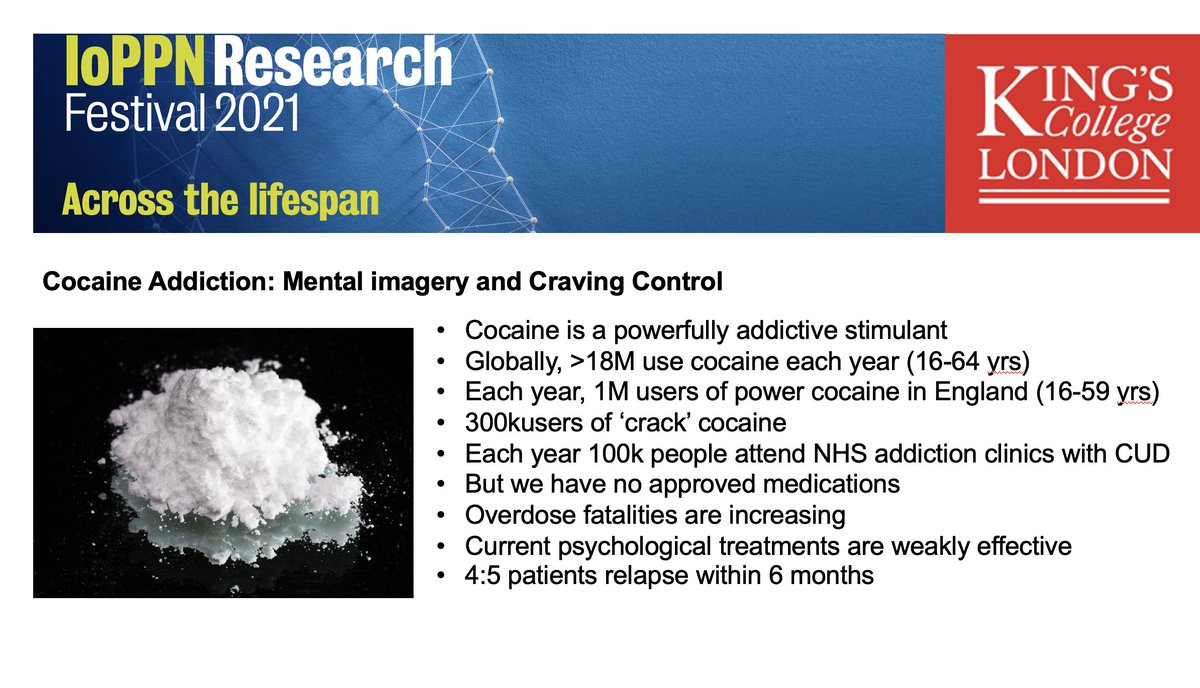
With no licensed medication therapies, and psychosocial interventions of limited effectiveness, we urgently need better therapies to offer patients, says John Marsden at #IoPPNfestival
Memory-focussed Cognitive Therapy for Cocaine Use Disorder, presented by John Marsden at #IoPPNfestival 

Marsden J et al. (2017) Memory-focused cognitive therapy for cocaine use disorder: Rationale, design and protocol for an external pilot randomised controlled trial. #IoPPNfestival
ncbi.nlm.nih.gov/pmc/articles/P…
ncbi.nlm.nih.gov/pmc/articles/P…
Marsden J. et al. (2018) Memory-Focused Cognitive Therapy for Cocaine Use Disorder: Theory, Procedures and Preliminary Evidence From an External Pilot Randomised Controlled Trial #IoPPNfestival
ncbi.nlm.nih.gov/pmc/articles/P…
ncbi.nlm.nih.gov/pmc/articles/P…
Goetz C et al. Does craving for cocaine mediate cocaine use? Analysis of a randomized controlled pilot trial of memory-focused cognitive therapy #IoPPNfestival
doi.org/10.1177/204380…
doi.org/10.1177/204380…
Next up is @SalisburyMH from @GMentalHealth who will be giving a short talk entitled "Improving mental health: when expertise is not enough" #IoPPNfestival 
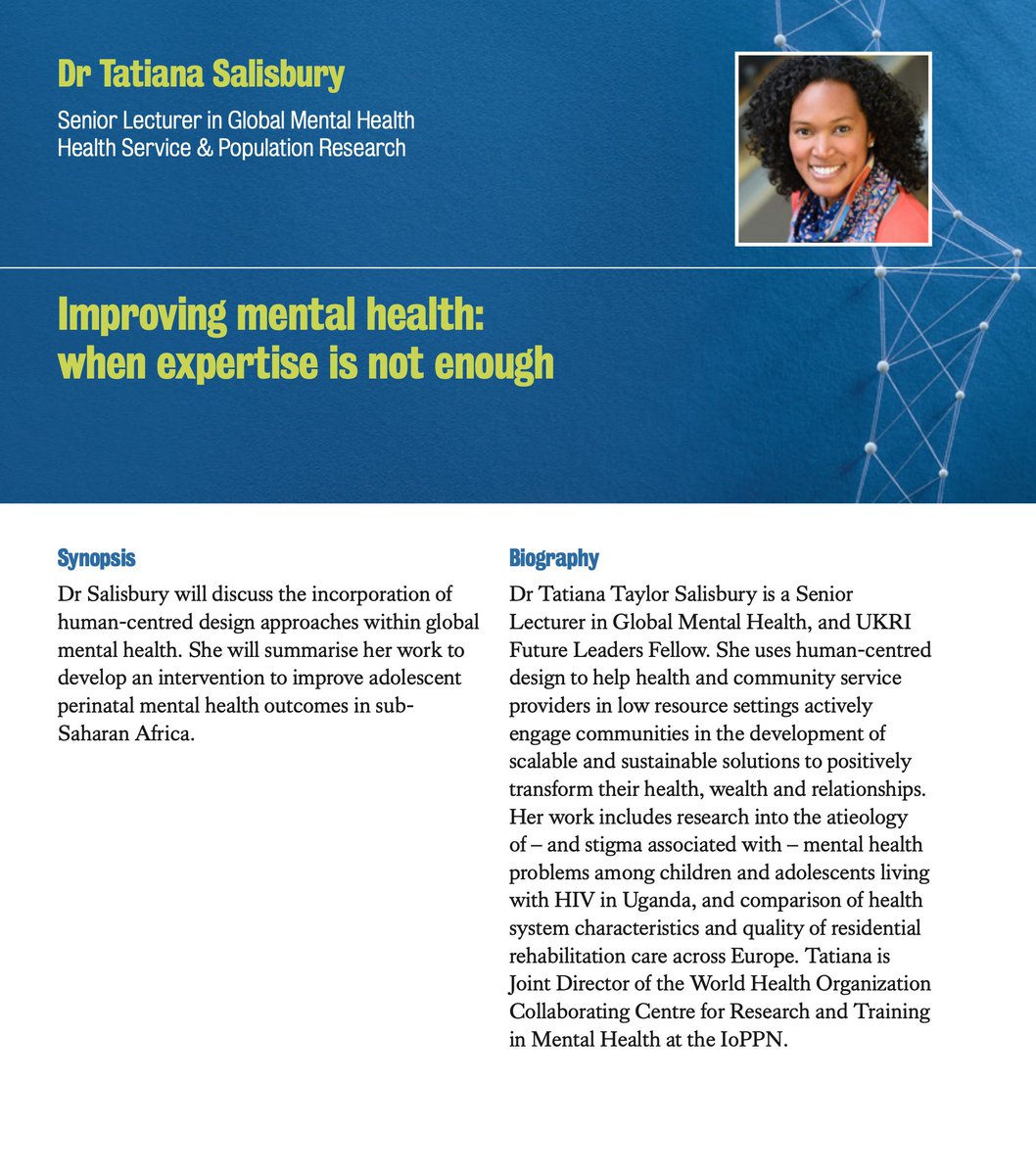
At #IoPPNfestival @SalisburyMH is citing the MRC Framework for the Development and Evaluation of RTs for Complex Interventions to improve Health
Are we involving the right people at the right stage of intervention development?
Are we involving the right people at the right stage of intervention development?

The number of teenage pregnancies is expected to rise on the African continent. With the global focus on pregnancy prevention these girls are largely left without the support to ensure both they and their babies thrive, says @SalisburyMH at #IoPPNfestival
Mental health interventions are traditionally developed by experts with limited engagement of providers and recipients leading to interventions with little demand that fail to scale, says @SalisburyMH at #IoPPNfestival 

The INSPIRE project is partnering with young women, their families, providers and governments in Kenya and Mozambique to design, implement and test interventions to support teenage mental health during pregnancy and the year after birth, says @SalisburyMH at #IoPPNfestival 
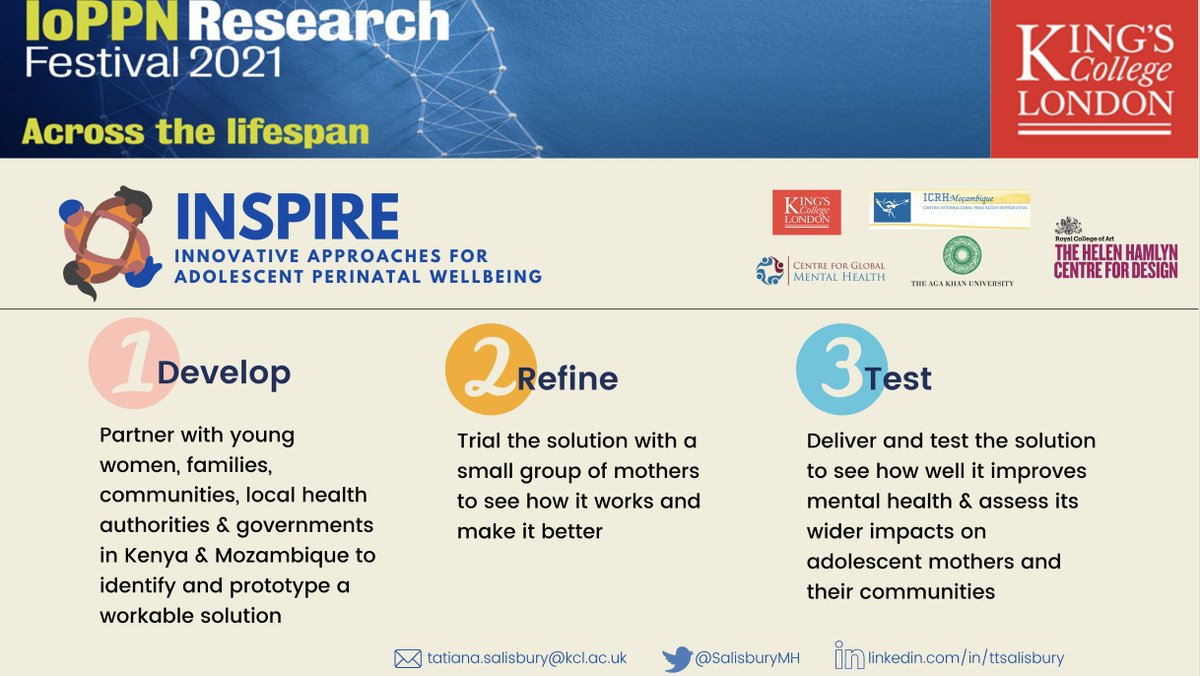
.@SalisburyMH et al (2021) Integrating human-centred design into the development of an intervention to improve the mental wellbeing of young women in the perinatal period: The Catalyst Project. #IoPPNfestival …pregnancychildbirth.biomedcentral.com/articles/10.11…
Our next speaker is Matthew Grubb @GrubbLab from @dev_neuro who will be "Getting nosey about brain repair" #IoPPNfestival 
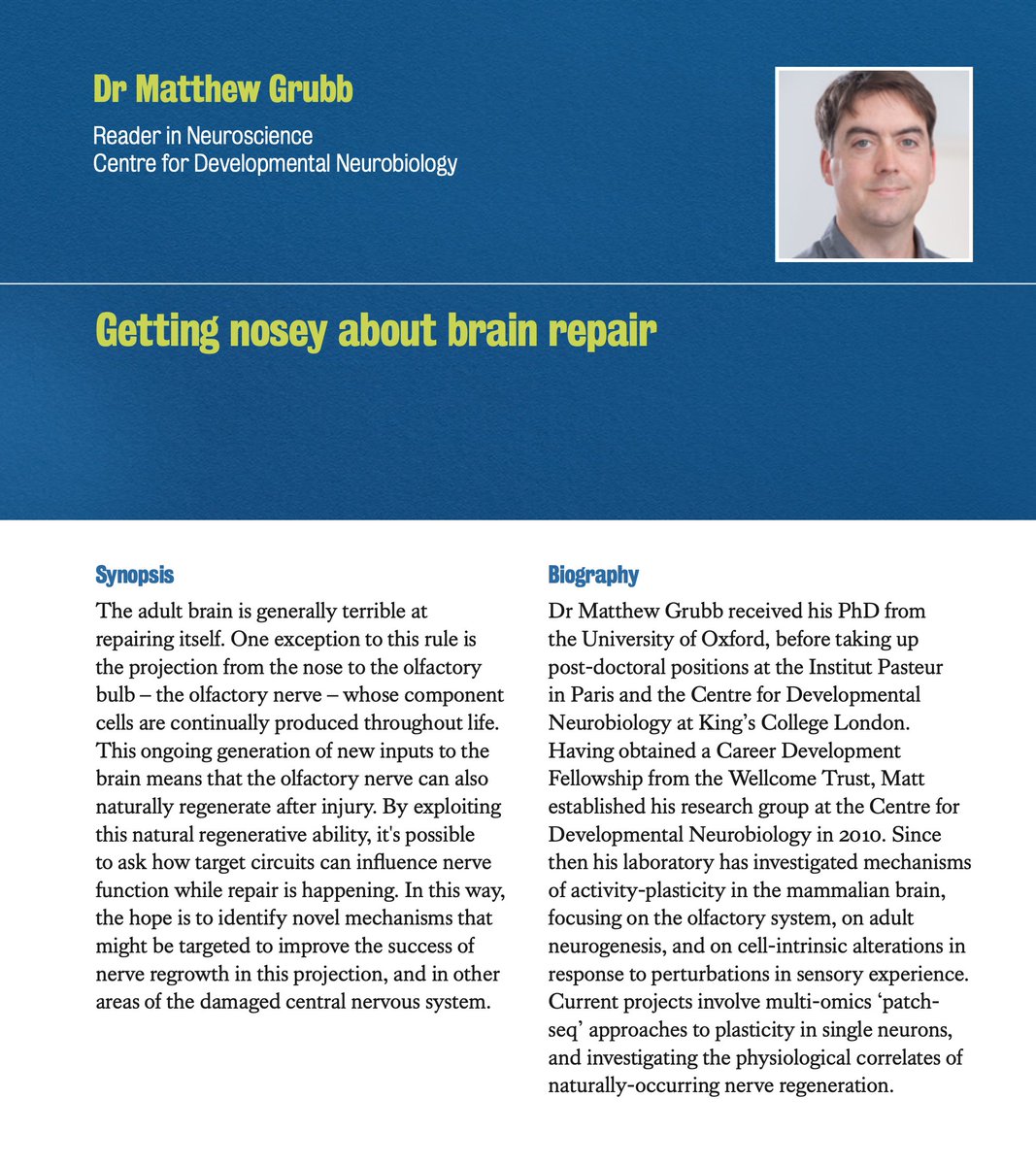
The brain is usually terrible at repairing itself, but we believe we can learn important and useful lessons from one part of the CNS which can successfully regenerate: the olfactory system, says @GrubbLab at #IoPPNfestival
Successful functional regeneration requires not just re-growth of nerves, but also interactions with the target circuitry they re-connect with. In our case, these are the neurons in the olfactory bulb which receive re-growing input from the nose, says @GrubbLab at #IoPPNfestival 

We are studying mechanisms of plasticity in the olfactory bulb which may be crucial for successfully restoring system function after naturally occurring nerve regeneration, and which may inspire attempts to repair circuits elsewhere in the brain, says @GrubbLab at #IoPPNfestival 

Our next speaker is Ralica Dimitrova (who works with Grainne McAlonan) and will be talking about "Characterising heterogeneity in the developing neonatal brain" #IoPPNfestival 

Can we capture heterogeneity in infant brain development? asks Ralica Dimitrova at #IoPPNfestival 

We can use normative modelling to provide a more personalised estimate of how individual brains might develop, says Dimitrova #IoPPNfestival 

Individualised assessment of brain development could include:
-Automatic Detection of Neonatal Brain Injury on MRI
-Personalised assessment of brain maturation across development
-Individualised prediction of later neurodevelopment
#IoPPNfestival
-Automatic Detection of Neonatal Brain Injury on MRI
-Personalised assessment of brain maturation across development
-Individualised prediction of later neurodevelopment
#IoPPNfestival

Now we have one of the two 3-Minute Thesis finalists: Curie Kim @curiekphd, talking about "The positive impact of intermittent fasting on memory and the brain" #IoPPNfestival 

The hippocampus continues to generate new cells throughout life, says @curiekphd #IoPPNfestival
Her PhD looks at using the 5:2 diet to potentially boost neurogenesis.
Good luck in the competition Curie, AND good luck with your PhD. Keep us posted!
Her PhD looks at using the 5:2 diet to potentially boost neurogenesis.
Good luck in the competition Curie, AND good luck with your PhD. Keep us posted!
Next up is @drkatieyoung talking about the @rampstudy "Anxiety and depression during the COVID-19 pandemic" #IoPPNfestival 

We are monitoring mental health during the pandemic in over 30,000 individuals across the UK, says @drkatieyoung at #IoPPNfestival 
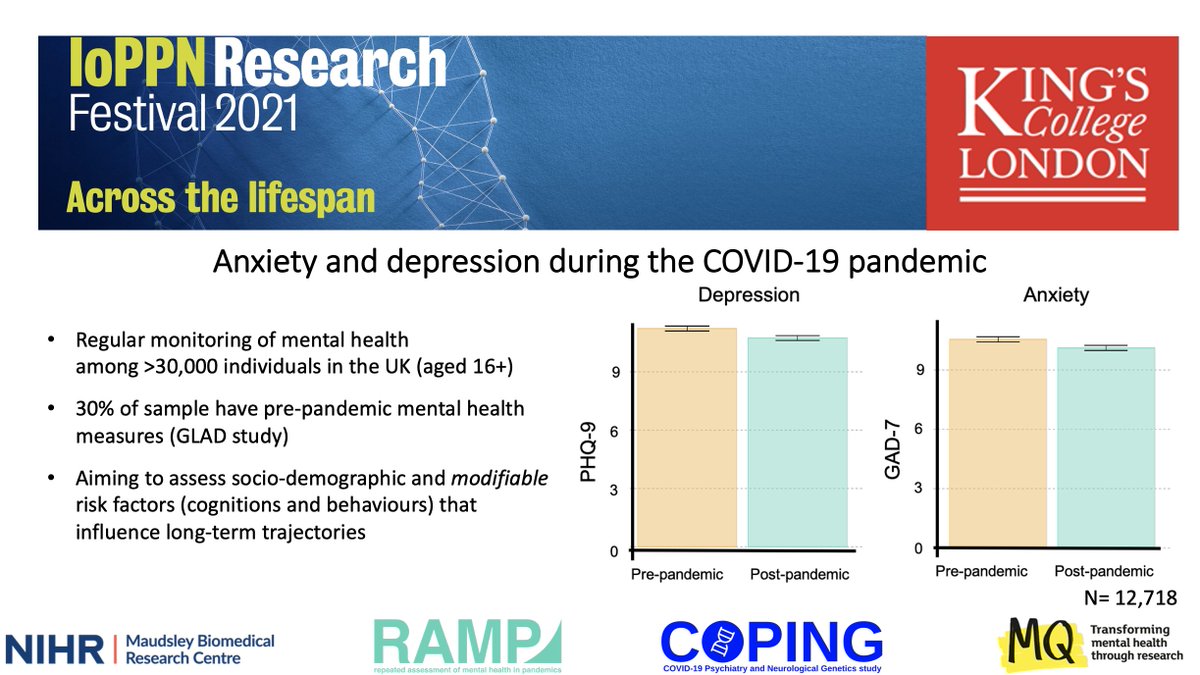
We are also looking at whether certain groups are at greater risk for worsening symptoms, such as young people, students, people who are unemployed, or those with pre-existing mental health problems, says @drkatieyoung at #IoPPNfestival 



Our next speaker is @_ChrisAlbertyn from @KCL_OAP @ARK_KCL @DEMONNetworkUK who is going to give a short talk entitled "Dementia in the digital age – the role of artificial intelligence" #IoPPNfestival 

Healthcare digitalisation and longitudinal cohort studies have led to a wealth of labelled data that could lead to innovation in dementia research and practice, says @_ChrisAlbertyn #IoPPNfestival 

Artificial intelligence methods, e.g deep learning, are particularly suited to identifying patterns in complex non-linear data, says @_ChrisAlbertyn #IoPPNfestival
Applied data science in ageing and dementia research is still in its infancy. The first priority is to link clinical and data experts, and data sources, to achieve maximum translational impact, says @_ChrisAlbertyn #IoPPNfestival 

You can find out more about the Longevity AI Consortium here #IoPPNfestival
kcl.ac.uk/health/researc…
kcl.ac.uk/health/researc…
The DEMON dementia Network is here #IoPPNfestival demondementia.com
The Dementias platform UK portal #IoPPNfestival portal.dementiasplatform.uk
And here's more info on the DEMON & ARK launch event #IoPPNfestival demondementia.com/digital-innova…
Our last speaker before the tea break is @rina_dutta from @KingsIoPPN @NIHRMaudsleyBRC @MaudsleyNHS who will be talking about "Data science to understand suicidality and self-harm in the digital age" #IoPPNfestival 

Predicting suicide is like searching for a needle in a haystack, because of the low population base rate of suicide and low positive predictive values of prediction tools and scales, says @rina_dutta at #IoPPNfestival 

Applying Natural Language Processing and Machine Learning to electronic health records can help understand dynamic changes in risk periods leading up to a suicide attempt, says @rina_dutta at #IoPPNfestival 

Data science is being used to understand how social media and smartphone use may relate to self-harm behaviour: an important question in the digital age, says @rina_dutta at #IoPPNfestival 

Bittar et al. Reviewing a decade of research into suicide and related behaviour using the South London and Maudsley NHS Foundation Trust Clinical Record Interactive Search (CRIS) system #IoPPNfestival doi.org/10.3389/fpsyt.…
Velupillai et al (2019) Risk Assessment Tools and Data-driven Approaches for Predicting and Preventing Suicidal Behaviour #IoPPNfestival doi.org/10.3389/fpsyt.…
Velupillai (2019) Identifying Suicidal Adolescents from Mental Health Records Using Natural Language Processing #IoPPNfestival doi.org/10.3233/SHTI19…
Sedgwick et al (2019) Social media, internet use and suicide attempts in adolescents #IoPPNfestival ncbi.nlm.nih.gov/pmc/articles/P…
Fernandes et al (2018) Identifying Suicide Ideation and Suicidal Attempts in a Psychiatric Clinical Research Database using Natural Language Processing #IoPPNfestival
doi.org/10.1038/s41598…
doi.org/10.1038/s41598…
Right, we're going to have a tea break now, so if you're following the tweets, join us again at 3.50pm BST for what promises to be a fabulous keynote from Prof Terrie Moffitt from @SGDPCentreKCL & @DukePsychNeuro #IoPPNfestival
I interviewed Terrie a few weeks ago for the #IoPPNfestival, so you can get in the mood for her keynote talk by listening to this podcast soundcloud.com/national-elf-s…
It's time now for Prof Terrie Moffitt from @SGDPCentreKCL & @DukePsychNeuro to give her #IoPPNfestival keynote talk entitled: "Surprises from 4 decades of tracking mental health" 

Almost everyone experiences a mental health problem sooner or later, so none of us should feel entitled to stigma toward others who have a mental health problem, says Terrie Moffitt at #IoPPNfestival
The younger that mental health problems begin, the more years they tend to last and the more they tend to expand to multiple different diagnoses, so the biggest priority for mental health care should be effective help for young people, says Terrie Moffitt at #IoPPNfestival
Virtually nobody keeps 1 diagnosis & most people experience many different kinds of mental health problems over their lifetimes, so treatments should do more than suppress current symptoms, treatments should prepare us to prevent our future mental health problems #IoPPNfestival
We've published a blog by @donamatthews on research by Caspi & Moffitt, published by @JAMANetworkOpen "Longitudinal assessment of mental disorders and comorbidities across four decades among participants in the Dunedin birth cohort Study" elfi.sh/32S0DT2 #IoPPNfestival
People in the Dunedin study have regularly changing mental health diagnoses, across the 40 years of the study. This is what Terrie Moffitt is talking about today at #IoPPNfestival 

The Dunedin Study is an ongoing longitudinal cohort study of 1,037 participants from New Zealand 1972-73. When the participants were 11 (1983/84), it was first cohort where mental health disorders were measured in children using standardised diagnostic interviews #IoPPNfestival 




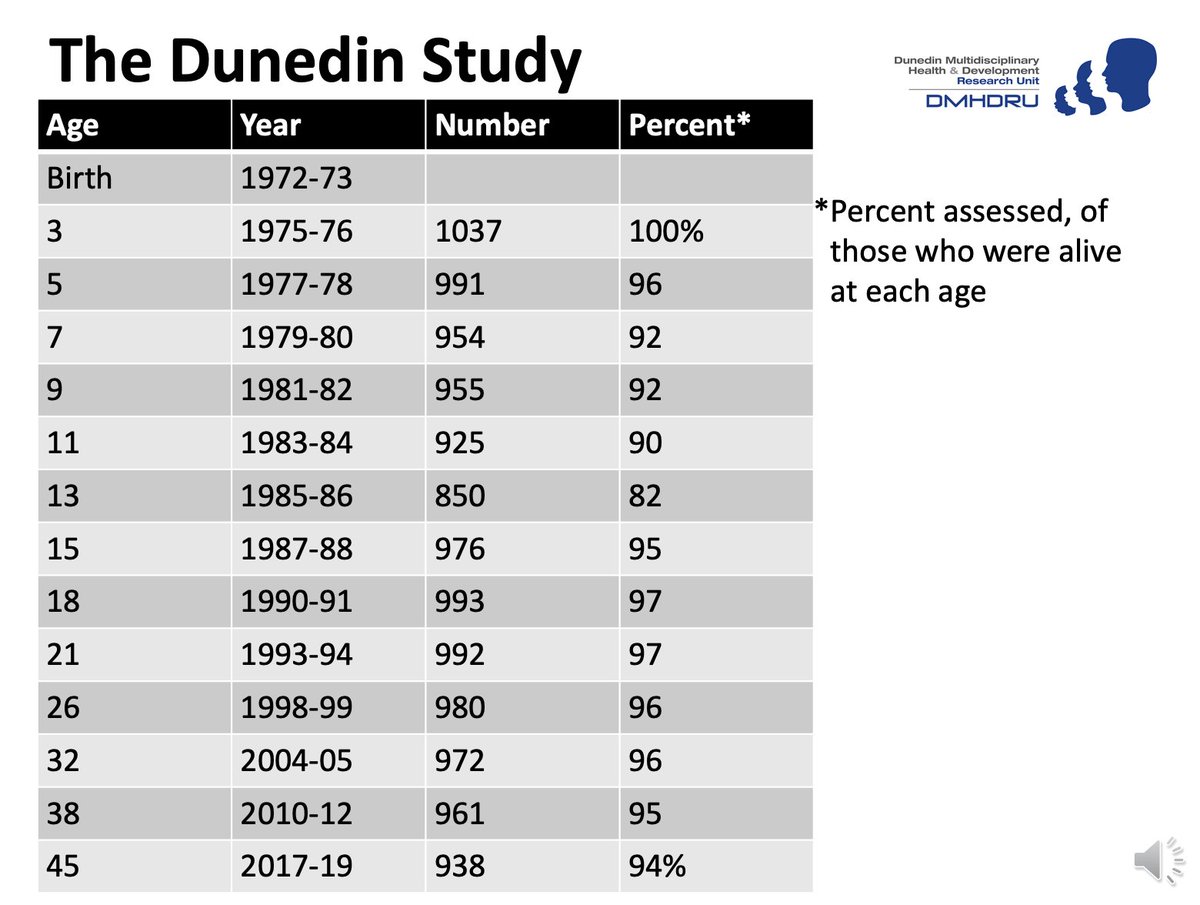


Participants characterised by only one pure disorder were atypical, e.g. among participants ever diagnosed with an internalising disorder, most also experienced externalising or thought disorders and another 16% had multiple kinds of internalising disorders #IoPPNfestival 

85% of people in the Dunedin study had a mental health condition at some point during their participation in the study.
It's normal to have a mental illness at some point in your life #IoPPNfestival
It's normal to have a mental illness at some point in your life #IoPPNfestival

The Dunedin study figures of mental health prevalence are similar to those across many other studies. It's not an outlier! #IoPPNfestival 

Mental illness affects most of us at some time, says Terrie Moffitt at #IoPPNfestival
Surely this knowledge should reduce stigma and more uptake of effective treatment?
Surely this knowledge should reduce stigma and more uptake of effective treatment?

Most people have first onset of mental illness as an adolescent, says Terrie Moffitt at #IoPPNfestival 

Early onset of mental illness predicts persistence and diversification #IoPPNfestival 



By age 45, over 80% of people who experienced one psychiatric disorder experienced at least one other psychiatric disorder #IoPPNfestival 

It's rare for individuals to retain a single mental illness diagnosis across a lifetime, so does it make sense for us to organise our health services and clinics by diagnosis? #IoPPNfestival 

People DO NOT experience different kinds of psychiatric disorders across their life course in a meaningful sequence or pattern #IoPPNfestival 
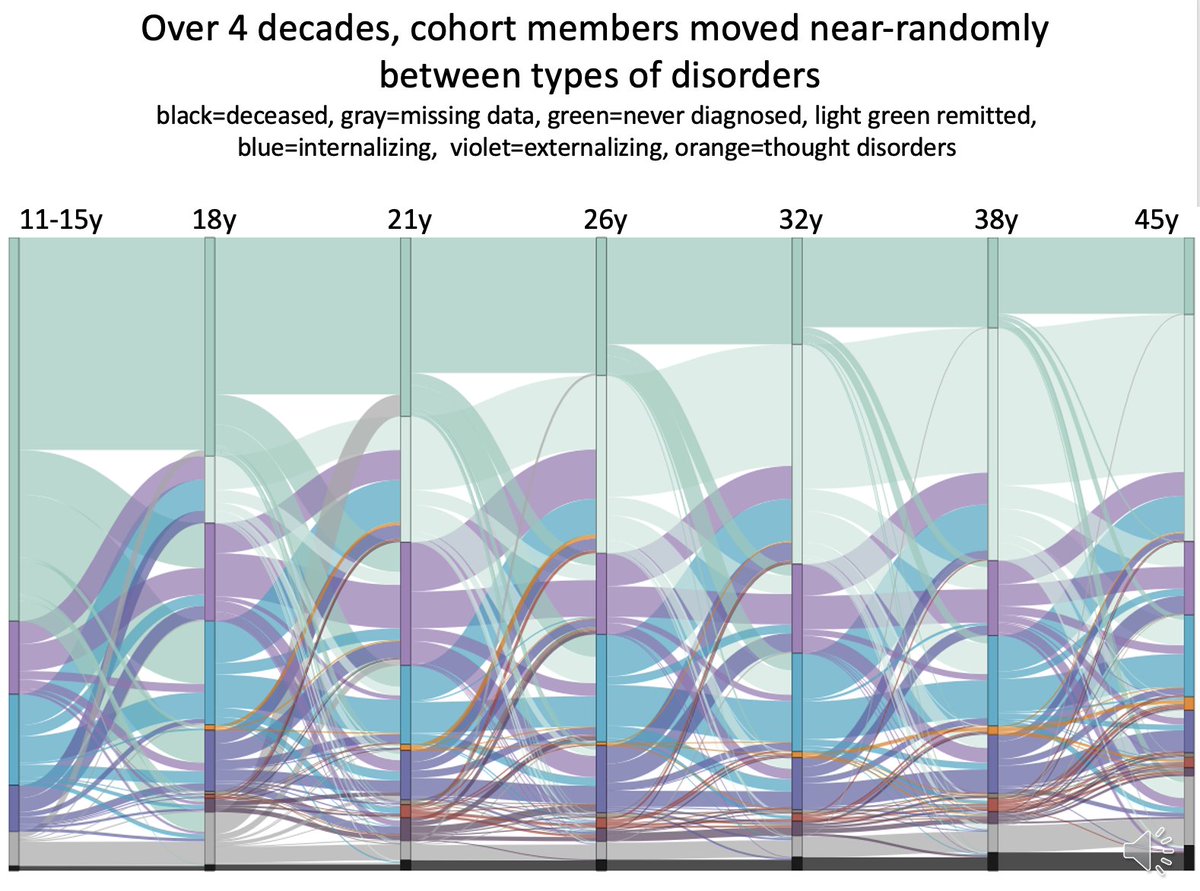
Looking specifically at mental health inpatients, Moffitt et al found unique patterns for all patients, no meaningful patterns across mental health diagnoses #IoPPNfestival 



Terrie Moffitt: "Therapy cannot just mitigate the presenting symptoms, but must also build skills for maintaining enduring mental health. The life-course approach makes transdiagnostic interventions a high priority." #IoPPNfestival 

Comments and questions about Terrie Moffitt's fantastic keynote at #IoPPNfestival 👇🏽 

Now we have another series of lightning talks, starting with Rosalyn Moran who will talk about "Pushing Beliefs, Neuromodulators & Computational Psychiatry" #IoPPNfestival 
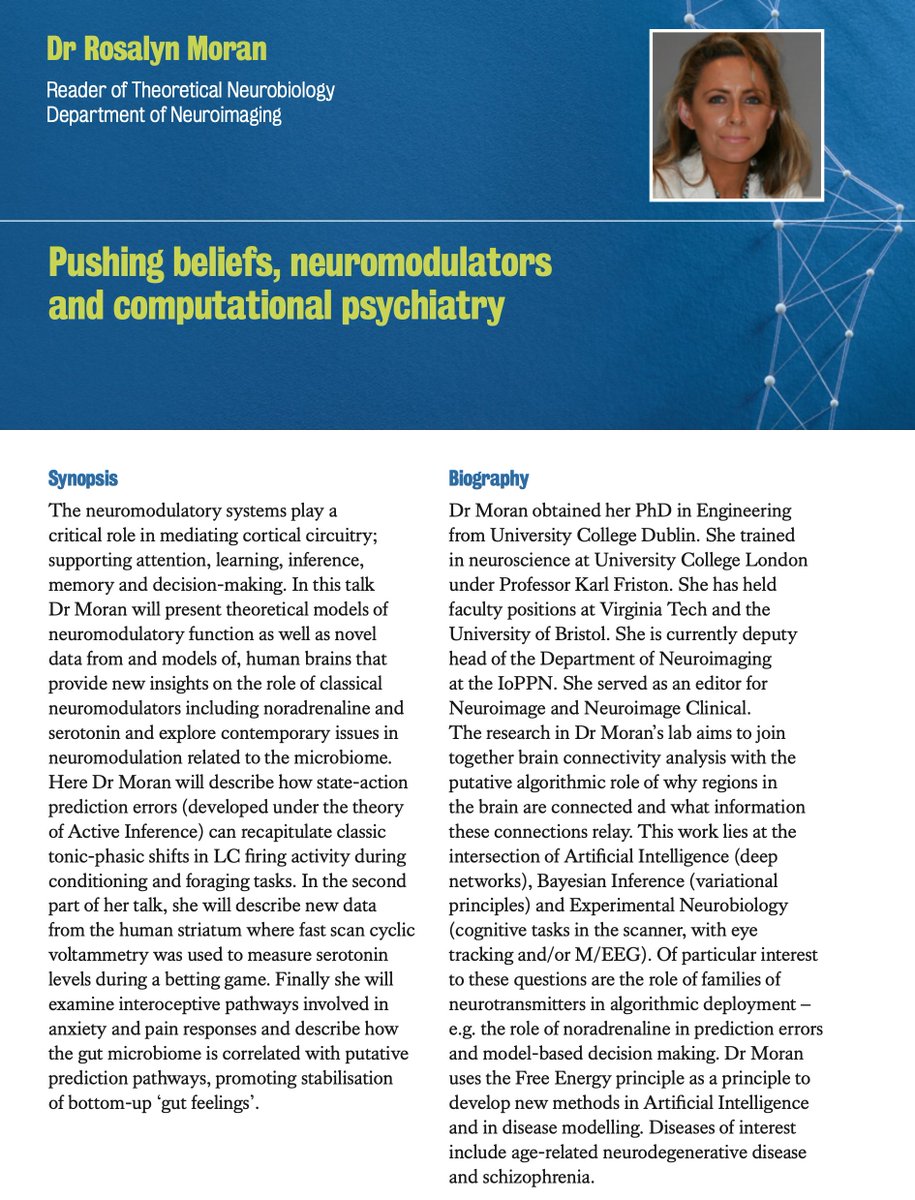
Rosalyn Moran promises to tell us about:
- Free Energy Principle
- Dynamic Causal Models
- Human Fast Scan Cyclic Voltammetry
#IoPPNfestival
- Free Energy Principle
- Dynamic Causal Models
- Human Fast Scan Cyclic Voltammetry
#IoPPNfestival

Gilbert & Moran (2016) Inputs to prefrontal cortex support visual recognition in the aging brain #IoPPNfestival nature.com/articles/srep3… 

Our next speaker is Gemma Modinos @g_modinos who is going to talk about the "Neurobiology of psychosis risk: From mechanistic to big data approaches" #IoPPNfestival 

Using neuroimaging, we have observed that healthy people with subclinical psychosis-like experiences showed higher brain activity when processing emotion, says @g_modinos at #IoPPNfestival 

In people at clinical high-risk for psychosis, higher reactivity to negative emotion was linked to lower volume in emotion-related brain regions and the development of poor functional outcomes, says @g_modinos at #IoPPNfestival
Focusing on brain excitation/inhibition balance, we use comparable neuroimaging methods in human/animal models to understand with more precision the role that these mechanisms may play in expression of psychosis-like experiences & behaviours, says @g_modinos at #IoPPNfestival
Complementing these smaller mechanistic studies, I recently created the ENIGMA Schizotypy consortium, bringing together neuroimaging researchers worldwide for the study of the neural correlates of subclinical psychosis-like experiences, says @g_modinos at #IoPPNfestival
Our first study (pre-print available) amassed over ~3,000 scans, and we have several exciting new projects in the pipeline, says @g_modinos at #IoPPNfestival
Check out the Modinos Lab website: modinoslab.com for more information
Check out the Modinos Lab website: modinoslab.com for more information
Our next speaker is Gerome Breen @psychgenomics who is suggesting that "Anorexia nervosa is both a psychiatric and metabolic disorder" #IoPPNfestival 

50-60% of the risk for eating disorders is genetic, says @psychgenomics, and the @edgiuk study is trying to recruit 10,000 people with lived experience of an eating disorder #IoPPNfestival
Genetic evidence strongly suggests that anorexia nervosa may be a metabolic and psychiatric disorder, says @psychgenomics at #IoPPNfestival
Early intervention for eating disorders needs to focus not just on children, as two thirds of cases have onset between 16-30 years of age, says @psychgenomics at #IoPPNfestival
Check out the edgiuk.org website for more information #IoPPNfestival
Our next speaker is Maria Elisa Serrano Navacerrada who is going to talk about "Imaging brain synaptic density across the lifespan: from normal to pathological" #IoPPNfestival 

The brain is a plastic organ formed by neurons, which communicate with each other through connexions called synapses #IoPPNfestival
The number of synapses in a region (or synaptic density) varies across the lifespan and could be an interesting biomarker for different neurodevelopmental and neurological diseases, says Serrano Navacerrada at #IoPPNfestival
The use of SV2A PET radiotracers, such as [18F]UCB-H, allows the in vivo quantification of synaptic density through the measurement of the SV2A concentration (presynaptic protein) #IoPPNfestival
In healthy rats, [18F]UCB-H shows an increase in synaptic density from puberty to adulthood, which may be linked to an establishment/strengthening of synapses, says Serrano Navacerrada at #IoPPNfestival
Quantifying brain synaptic density is useful not only to understand how the brain develops, but to early diagnose neurological problems #IoPPNfestival
For instance, epileptic rats have a lower increase in synaptic density through their lifespan than healthy animals. SV2A radiotracers are, therefore, a promising tool in the fight against neurological diseases, says Serrano Navacerrada at #IoPPNfestival
Find out more about this topic #IoPPNfestival
Our next speaker is Virginia Carter Leno who is giving a short talk entitled "Associations between theory of mind and conduct problems in autistic and non-autistic youth" #IoPPNfestival 

Autistic youth experience additional mental health problems at a far higher rate than non-autistic youth. The reasons behind this increase in rates are not well understood, says Virginia Carter Leno at #IoPPNfestival 
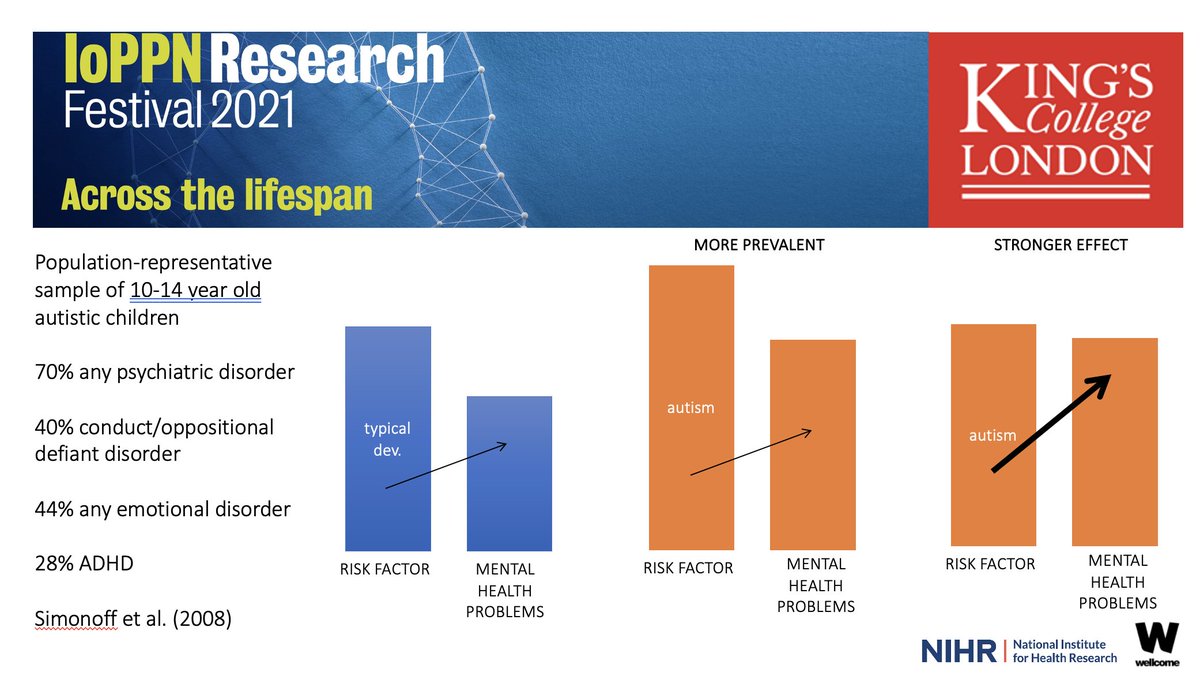
Difficulties in theory of mind, the ability to infer and understand the mental states of others, have been implicated as a risk factor for behavioural or conduct problems in typically developing children, says Virginia Carter Leno at #IoPPNfestival 

The association between theory of mind difficulties and conduct problems in autistic youth has not yet been tested, says Virginia Carter Leno at #IoPPNfestival
We found difficulties in theory of mind were associated with increased rates of conduct problems in both autistic and non-autistic youth, suggesting difficulties in theory of mind may be a trans-diagnostic risk factor, says Virginia Carter Leno at #IoPPNfestival 

The higher likelihood of having theory of mind difficulties associated with autism may in part explain the increased rates of conduct problems in autistic children, says Virginia Carter Leno at #IoPPNfestival
Further info here: Carter Leno et al (2020) Associations between theory of mind and conduct problems in autistic and non-autistic youth doi.org/10.1002/aur.23… #IoPPNfestival
Our next speaker is Sam Cooke who will be talking about "Distinguishing the novel from the familiar: Cortical plasticity across the lifespan" #IoPPNfestival 

We study habituation, a poorly understood but fundamentally important form of learning by which animals filter out innocuous stimuli to dedicate energy and attention to important elements of the environment, says Sam Cooke at #IoPPNfestival
Habituation is deficient in a wide range of human brain disorders that occur at either end of the human lifespan, says Sam Cooke at #IoPPNfestival 

We have developed methods to directly observe plasticity in the brain as animals learn and to intervene in that plasticity to understand the underlying mechanisms at a molecular and circuit level, says Sam Cooke at #IoPPNfestival
We are able to measure plasticity occurring during learning not only using invasive recording methods, but also using non-invasive recording techniques, such as EEG, which can be translated into human subjects, says Sam Cooke at #IoPPNfestival 

Cooke SF and Ramaswami M (2020) Ignoring the Innocuous: Neural Mechanisms of Habituation (Chapter 17) #IoPPNfestival books.google.co.uk/books?hl=en&lr…
Cooke et al (2015) Visual Recognition Memory, Manifest as Long-Term Habituation, Requires Synaptic Plasticity in V1 #IoPPNfestival nature.com/articles/nn.39…
Our next speaker is @LucyChester13 who is the second of two 3-minute thesis finalists talking today at #IoPPNfestival. Lucy will be telling us about her work on "Cannabis and psychosis" 

Cannabis use and psychosis are interlinked, but we’re not sure exactly how, says @LucyChester13 at #IoPPNfestival
The EU-GEI study followed people at Ultra-High Risk (UHR) for psychosis for two years, then compared the cannabis use of those who did get psychosis with those who didn’t, says @LucyChester13 at #IoPPNfestival
If cannabis does increase risk of psychosis, it’s likely linked to how often it is used, how strong the drug is and use in childhood/adolescence, says @LucyChester13 at #IoPPNfestival
We have lots of elf blogs on cannabis and psychosis if you're interested in reading more about the latest research in this field #IoPPNfestival
nationalelfservice.net/tag/cannabis+p…
nationalelfservice.net/tag/cannabis+p…
Our next speaker is June Brown who who talk about "Offering accessible early interventions for depression and anxiety across the lifespan "#IoPPNfestival 

- Only 30% of people with mental health problems seek help from services
- Common barriers are stigma, low mental health knowledge & self-reliance
- The ‘NESPAC’ model has been shown to improve help-seeking behaviour
June Brown #IoPPNfestival
- Common barriers are stigma, low mental health knowledge & self-reliance
- The ‘NESPAC’ model has been shown to improve help-seeking behaviour
June Brown #IoPPNfestival
Linda Gask @suzypuss et al (2012) Improving access to psychosocial interventions for common mental health problems in the United Kingdom. Cited by June Brown at #IoPPNfestival
bmchealthservres.biomedcentral.com/articles/10.11…
bmchealthservres.biomedcentral.com/articles/10.11…
The ‘NEPSAC’ bridge model combines a "non-stigmatising pathway" with a "more acceptable intervention" says June Brown at #IoPPNfestival 

We need to reach all people who need help for depression and anxiety, says June Brown at #IoPPNfestival 

Next steps for this important work led by June Brown #IoPPNfestival 

Our next speaker is @LaurenCarsonPhD from @lifecourse_KCL @KingsIoPPN who is going to tell us about the "The eLIXIR Partnership" #IoPPNfestival 

The eLIXIR Partnership is a dynamic data linkage project aims to combine maternal and child healthcare data to provide population level life course data, says @LaurenCarsonPhD at #IoPPNfestival 

The data captured within eLIXIR allows for research across a variety of research fields including women’s health, infant & child health, public health, healthcare management, and implementation science, says @LaurenCarsonPhD at #IoPPNfestival
Studies undertaken using eLIXIR will have not only have implications for local healthcare improvement but also the potential to provide evidence to influence healthcare in similar national/global settings, says @LaurenCarsonPhD at #IoPPNfestival
Our final speaker today at #IoPPNfestival is @petrouliet who is going to talk about "Deciphering the role of blood metabolites in midlife cognitive function and Alzheimer’s disease" 
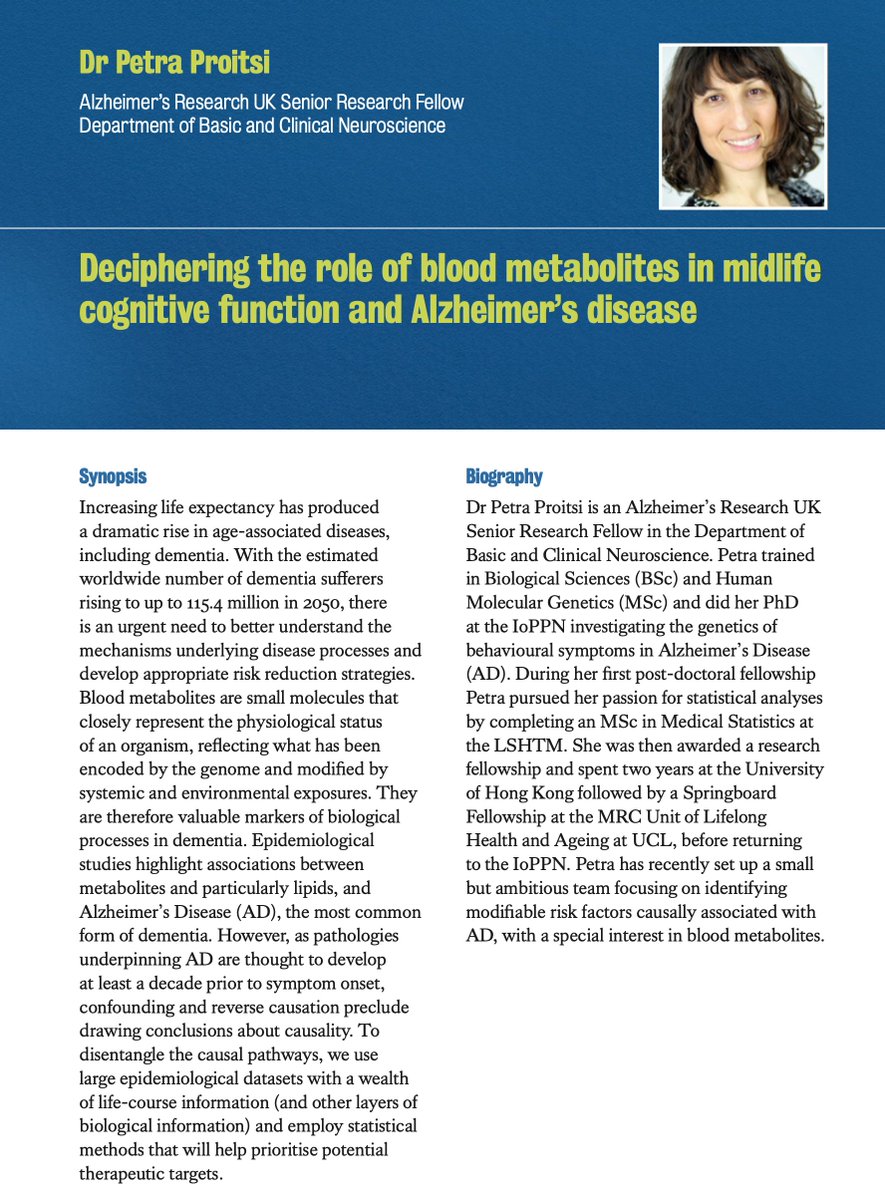
Alzheimer’s Disease is a devastating disorder, for which there are currently no disease modifying treatments; this highlights the urgency for precision medicine biomarker guided strategies, says @petrouliet at #IoPPNfestival 

Blood metabolites are small molecules, such as lipids, representing the physiological status of an organism, and are valuable markers of biological processes in Alzheimer’s Disease, says @petrouliet at #IoPPNfestival 

Our work highlights blood metabolites assoc w late midlife cognitive function which potentially lie on causal pathway to Alzheimer’s. Such findings can facilitate further research into early intervention strategies & more targeted therapeutics @petrouliet at #IoPPNfestival 

.@petrouliet et al Metabolic correlates of late midlife cognitive function: findings from the 1946 British Birth Cohort #IoPPNfestival
medrxiv.org/content/10.110…
medrxiv.org/content/10.110…
That's it from the #IoPPNfestival!
I hope you've found the tweeting interesting and helpful.
Don't forget the podcast if you fancy a bit more listening from our wonderful keynote speakers: Grainne McAlonan or Terrie Moffitt
soundcloud.com/national-elf-s…
I hope you've found the tweeting interesting and helpful.
Don't forget the podcast if you fancy a bit more listening from our wonderful keynote speakers: Grainne McAlonan or Terrie Moffitt
soundcloud.com/national-elf-s…
Thanks to everyone who tweeted at the #IoPPNfestival today!
- 147 people
- 445 tweets
- Over 18 million Twitter impressions
Not bad for less than half a day of online talks.
As always, it was a pleasure covering this @KingsIoPPN conference 👏🏽
- 147 people
- 445 tweets
- Over 18 million Twitter impressions
Not bad for less than half a day of online talks.
As always, it was a pleasure covering this @KingsIoPPN conference 👏🏽

• • •
Missing some Tweet in this thread? You can try to
force a refresh







